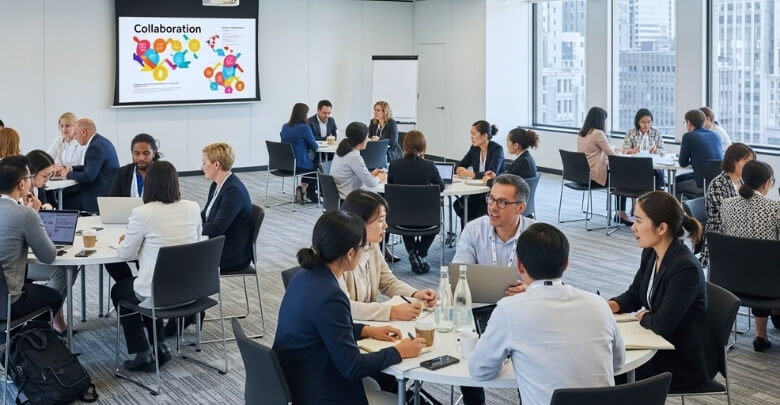Conferences bring people together to share ideas, listen to talks, and learn something new in a group setting. While speeches and presentations are common, many people also wonder about interactive sessions, which leads them to think about what is a workshop at a conference?
A workshop at a conference is an interactive session where participants practice skills, solve problems, and learn by doing. Unlike regular talks, workshops involve group activities, hands-on tasks, and real-time learning guided by a facilitator for practical outcomes.
If you are curious about workshops and want to see how they add value, this article covers everything in detail. From who leads them to how they work, you will find all the important points explained clearly here.
What is a Workshop at a Conference?
When you think about a conference, it is not only about speeches and presentations. People also want spaces where they can connect, share ideas, and practice new skills in real time. This is where workshops stand out, so let’s look closer.

Interactive Nature
Workshops are designed to keep participants active. Instead of just listening, people join group discussions, activities, and exercises. This type of session makes learning lively and engaging. Because everyone takes part, the ideas stick better, and participants feel more connected to what they are learning.
Hands-on Learning
One big strength of a workshop is the chance to try things directly. If the workshop is about writing or design, you will actually work on examples during the session. This makes the knowledge practical and useful. It also allows participants to understand concepts more clearly because they are practicing instead of only hearing about them.
Problem Solving
In many workshops, the facilitator presents a challenge or a problem, and the group works together to solve it. This encourages teamwork and creative thinking. People learn from each other’s approaches and come up with solutions that they might not have found alone. It makes the session more valuable and interesting.
Skill Building
Workshops are often centered on learning or improving a specific skill. This could be communication, teamwork, or even technical skills. The focus is on walking away with something useful that can be applied immediately. These sessions often add great value, especially for international events like conferences in Canada, the USA, or any other country, where people gather from diverse backgrounds to share and learn together.
Guided Facilitation
A trained facilitator leads the workshop, keeping the activities structured and on track. They guide the group, encourage participation, and make sure the session flows smoothly. Their role is important because they help participants stay focused and ensure that everyone benefits equally from the activities and discussions.
Clear Outcomes
Workshops are planned to achieve a result. At the end, participants may leave with a list of solutions, a strategy, or a better understanding of a concept. These outcomes are often practical and can be put to use in real situations, which is what makes them so effective compared to general talks.
Collaborative Setting
These sessions bring people together and create a team spirit. Instead of learning alone, participants share their knowledge, exchange experiences, and support each other’s ideas. This collaboration makes the environment more open and fun. It also helps build new connections that often last beyond the event itself.
Time Focused
Workshops are designed to be short and productive. They may last for a few hours or a day, but they remain concentrated on one main topic. This makes them easy to fit into a busy conference schedule. The limited time keeps the activities sharp, structured, and meaningful.
Practical Experience
The most important part of workshops is the real-time practice. Rather than just hearing theories, you apply them immediately in exercises. This hands-on approach makes the learning personal, and it is much easier to remember later. Participants often find this type of session more rewarding because they see instant results.
Workshops bring energy, teamwork, and practical learning to conferences. They turn events into active experiences where people not only listen but also contribute, share, and leave with real skills that they can use in everyday life.
Who Usually Leads a Workshop at a Conference?
Workshops at conferences are designed to give people practical learning, useful tips, and real-world ideas. These sessions are led by people who share their knowledge in simple and clear ways. Let’s look at who usually takes the lead.
Professional Trainers
Professional trainers often guide workshops because they are skilled at teaching and simplifying concepts. They know how to keep the group active with hands-on activities, discussions, and exercises. Their goal is to make sure participants not only listen but also practice and learn during the session.
Industry Experts
Industry experts bring deep knowledge and real examples from their work field. They share what works in real situations and explain new trends. Their experience helps participants understand the challenges and opportunities in the industry. This makes the workshop more practical and inspiring.
Skilled Professionals
Skilled professionals from different job roles also lead workshops. They share methods they use in their daily work and explain step-by-step processes. This type of guidance helps participants understand how to apply the same skills in their own tasks and projects.
Guest Speakers
Guest speakers are invited to add a special touch to workshops. They may be well-known figures, authors, or leaders in a field. Their talks often combine stories and lessons that make the session more memorable. This adds value and a fresh perspective to the workshop.
Experienced Mentors
Mentors who have long experience in teaching or guiding people are also common workshop leaders. They focus on sharing advice, personal insights, and career lessons. They help participants not only learn skills but also grow confidence in using those skills effectively.
A workshop is only as effective as the person leading it. Trainers, experts, professionals, and mentors each bring something different to the table. Their skills and experiences shape how much value the audience gains. That is why workshops often feel so engaging and practical.
How Is a Workshop Different From Other Sessions at a Conference?
Different types of sessions serve different purposes at a conference. Some are designed to inspire, some to teach, and some to spark discussion. The table below shows the key differences between workshops, keynote speeches, and panel discussions.
| Aspect | Workshop | Keynote Speech | Panel Discussion |
| Format | Hands-on session with activities, practice, and group work | One main speaker delivering a talk to all attendees | Group of experts discussing a topic with a moderator |
| Focus | Skill-building and practical learning | Inspiring ideas, big-picture themes, or setting the tone of the event | Different viewpoints and debates on a specific issue |
| Interaction | Highly interactive, participants often take part in tasks | Low interaction, mostly listening | Medium interaction, sometimes Q&A with the audience |
| Duration | Usually longer (1–3 hours or more) | Shorter (30–60 minutes) | Medium length (45–90 minutes) |
| Audience Size | Smaller groups for deeper learning | Entire conference audience | Medium to large, depending on topic and speakers |
| Outcome | Attendees gain practical skills or solve problems together | Attendees gain inspiration, motivation, or key insights | Attendees hear diverse opinions and perspectives |
Workshops give hands-on learning, keynote speeches set the overall tone with inspiring ideas, and panel discussions bring diverse opinions together. Each session type adds value in its own way, making the conference more complete and engaging.
How Do Workshops Reflect the Quality of a Conference?
Workshops are a key part of any conference, and they play a big role in showing how well the event is planned. The way these sessions are organized often gives a clear picture of the event’s quality. Let’s break this down in detail.
Structured Learning
A good workshop is not just about lectures. It is about step-by-step activities, practical lessons, and easy ways to apply knowledge. When participants feel they are gaining useful skills, it shows that the conference values their learning and overall experience.
Expert Guidance
The presence of skilled trainers or industry experts in workshops reflects high standards. These people bring real knowledge and practical advice that participants can use in their own work. Their guidance makes the sessions more reliable, professional, and worth the time spent.
Active Participation
Workshops that encourage people to join discussions, share ideas, and practice skills create stronger engagement. This hands-on approach keeps participants interested and involved. When such activities are well-designed, they show that the conference is built with care and thought.
Real Value
High-quality events, often found by identifying top-tier conferences, usually feature well-structured workshops that give participants real value. These workshops focus on solving real challenges, teaching new methods, and offering tools that can be used outside the event in everyday work.
Memorable Experience
Well-organized workshops leave a lasting impression on participants. They combine useful content, interactive tasks, and helpful resources in one session. When people remember what they learned and apply it later, it highlights the strong quality of the entire conference.
The quality of workshops reflects the effort put into the whole event. They show how much organizers care about real learning. When workshops are practical and engaging, the entire conference feels more professional. This is why workshops are a true measure of quality.
Who Can Attend a Workshop at a Conference?
Attending a workshop at a conference can be an exciting part of the event. People often wonder whether they can join freely or if there are certain rules. To understand this better, let’s look at how access usually works.
Open Access
Some workshops are open to all conference attendees. Anyone with a general ticket can walk in and join. This creates a friendly and welcoming environment where people from different backgrounds can come together, share ideas, and participate without any restrictions.
Limited Seats
Many workshops have limited spots because they are interactive and require smaller groups. Organizers often set a maximum number of participants. Once those seats are filled, no more people can join. This ensures that everyone attending gets enough attention and time.
Special Tickets
Certain workshops may need a separate ticket or registration. These are often special sessions that provide in-depth learning. People who want to attend must buy an add-on ticket in addition to their main conference pass, making these sessions more exclusive.
Group Specific
Sometimes, workshops are planned for a particular group, such as professionals in a field, members of an organization, or even specific age groups. This focus makes the workshop more effective since all participants share similar needs or goals during the session.
Pre-registration
Some workshops require advance registration. Participants must sign up before the event to secure their place. This helps organizers plan materials, seating, and activities properly. It also avoids confusion during the conference and ensures a smooth and organized session.
Workshops are designed in different ways to meet the needs of both organizers and participants. Checking the details before attending helps you know exactly what to expect and how to take part without missing out on valuable learning opportunities.
What Topics Are Covered in Workshops at Conferences?
Workshops at conferences are designed to match the overall theme of the event. The topics chosen usually connect directly to what participants want to learn or improve. They focus on useful skills, ideas, and methods. Let’s explore the common areas covered.
Business Skills
Many conferences offer workshops that focus on business growth and improvement. These cover subjects like marketing, sales strategies, communication, and planning. Such topics help participants sharpen their abilities to handle business challenges and understand how to achieve better results in their work or organizations.
Technical Training
Technical workshops are popular at events where the audience wants practical knowledge. These may include training on software, coding, engineering tools, or design systems. The goal is to give step-by-step instructions and hands-on practice so participants can use new skills in real projects quickly.
Leadership Growth
Leadership-focused workshops deal with building confidence, decision-making, and team management. They help participants understand how to guide others, solve problems, and take responsibility. These sessions are especially helpful for people who want to move into leadership roles or improve the way they manage groups.
Creative Thinking
Some workshops are centered on boosting creativity and innovation. These include brainstorming methods, design thinking, and idea development. By working through group activities and challenges, participants learn how to think outside the box and bring fresh ideas into their personal or professional lives.
Personal Development
Workshops on personal growth focus on skills like time management, stress control, and self-confidence. They often combine practical tips with interactive tasks to make learning easier. These topics help participants improve not only their careers but also their daily lives in simple ways.
Conference workshops cover a wide mix of topics, from business and leadership to technical training and personal growth. They are built to match the event theme and the needs of the audience. This variety ensures every participant finds something useful to learn.
How Long Does a Workshop at a Conference Usually Last?
Workshops are a big part of conferences, giving people a chance to learn, discuss, and practice new things in a group setting. Their length is not always the same, and it depends on different factors. Let’s look at the details.
Short Workshops
These sessions usually run between 45 and 60 minutes. They work well for quick learning and simple topics. The format is often interactive, with the speaker sharing useful tips or introducing a new tool. These workshops fit smoothly into packed conference schedules.
Medium-length Workshops
Workshops that run for 1.5 to 2 hours give more space for interaction. Attendees can take part in group discussions, activities, and hands-on exercises. This type of session is common at professional conferences where a deeper understanding and more time for questions are needed.
Long Workshops
Some workshops last between 3 and 6 hours or even a full day. These are usually designed for serious training or skill development. Often, people need to sign up in advance because they require more focus and commitment from both the trainers and participants.
What Affects Time
The schedule of the conference plays a big role in how long a workshop lasts. Complex topics or skill-based sessions also need extra time. The background of the audience matters too, as beginners may need longer explanations and step-by-step guidance compared to advanced participants.
Typical Duration
While there are shorter and longer versions, most workshops at conferences fall in the 1 to 2-hour range. This length gives enough time for teaching, practice, and questions without tiring the audience. Longer ones are usually for special training events.
Workshops come in different lengths, shaped by the topic, the conference plan, and the audience. Most often, you’ll find them running for about one to two hours, unless the event is designed for deeper training.
How Do Workshops Contribute to Professional Growth at Conferences?
Workshops at conferences are more than just side sessions. They give people real opportunities to learn, connect, and practice skills in ways that regular talks cannot. To see how they actually support professional growth, let’s break it down.
Practical Learning
Workshops focus on real practice instead of only theory. Participants try activities, solve problems, and test out new skills. This makes learning much more effective because people not only hear ideas but also apply them instantly in useful and memorable ways.
Networking Chances
A workshop brings people into smaller groups, which makes it easier to interact. Participants get to talk, share experiences, and connect with others who may have similar goals. These connections often turn into lasting professional relationships that help in the future.
Career Skills
Many events, including career development conferences, use workshops to give participants hands-on skills and real-world practice. These sessions are designed to build confidence and add tools that directly support professional growth, helping participants move forward in their fields.
Confidence Building
By working on tasks during the session, participants build confidence in their own abilities. They can test their ideas, ask questions, and learn through trial and error. This process makes them more prepared and comfortable when applying the skills in real life.
Direct Outcomes
Unlike general talks, workshops often end with specific results. These may be action plans, problem-solving strategies, or clear steps to use in professional settings. Having something concrete to take away makes the learning more valuable and easier to apply.
Workshops give professionals the chance to grow in clear, practical ways. They help participants strengthen skills, make connections, and leave with useful knowledge that can make a real difference in their careers.
FAQs About What is a Workshop at a Conference?
If you have ever asked yourself what is a conference workshop, it is simply a session designed to be interactive, hands-on, and focused on learning through participation. Below are some common questions and answers that help explain workshops in detail.
What Makes a Workshop Different From a Regular Class?
A workshop at a conference is not like a regular class in school. Instead of just listening to someone explain, participants get to join activities, share ideas, and practice skills. The setup is less formal and more interactive. This makes learning easier, fun, and memorable for everyone.
Why Are Workshops Important in Conferences?
Workshops are important because they allow people to practice real skills instead of only hearing theories. They bring participants together in smaller groups where learning feels more personal. These sessions often leave people with useful knowledge they can apply right away. This is why conferences without workshops often feel incomplete.
How Do Workshops Help Attendees Learn Better?
Workshops keep participants active through group tasks, exercises, and discussions. This style of learning is easier to remember compared to just listening. When people work on examples during the session, they understand the subject more clearly. It helps them apply the knowledge in real life without confusion.
Who Decides the Content of a Workshop?
The workshop content is usually planned by the conference organizers along with the facilitators. Organizers make sure the topics match the overall theme of the event. Facilitators then prepare activities, lessons, and examples that fit those goals. This teamwork ensures the session gives value to participants.
Can Workshops Be Attended by Beginners?
Yes, many workshops are designed for beginners. Facilitators often explain things step by step, which makes it easy for newcomers to understand. Activities are usually simple but effective in teaching new skills. This makes workshops welcoming for people with little or no experience in the topic.
Do Workshops Require Special Preparation?
Some workshops ask participants to bring laptops, notebooks, or certain tools. Others only need people to show up with interest and willingness to join. Organizers usually inform attendees in advance about what they need. Being prepared helps participants get the most out of the session.
How Are Workshops Usually Structured?
Workshops normally begin with a short introduction by the facilitator. Then, participants are guided through activities, group tasks, or problem-solving exercises. Time is also given for questions and discussions. At the end, the facilitator often summarizes key takeaways so people leave with clear results.
What Role Do Workshops Play in Networking?
Workshops create smaller groups where people can talk and share experiences freely. This helps participants connect with others in their field more easily. Unlike large talks, these sessions encourage direct interaction. Many people build lasting friendships or professional connections through workshop activities.
Are Workshops Suitable for Large Audiences?
Workshops work best in smaller groups because they focus on interaction and practice. With fewer people, everyone gets a chance to join in. Large audiences can make it harder to keep sessions interactive. That is why organizers often limit seats in workshops.
How Do Workshops Add Value Beyond Presentations?
Presentations give information, but workshops give practice. They allow people to test ideas, solve problems, and build skills on the spot. This makes the learning more personal and effective. By the end, participants leave with both knowledge and confidence to use it.
Conclusion
Workshops are one of the most effective ways to make a conference more engaging. They bring people together in smaller groups, create space for learning, and make knowledge easier to apply. When done well, they turn events into active, meaningful experiences.
If you are asking, what is a workshop at a conference? The answer is simple. It is a focused session where participants learn by doing, not just listening. Unlike speeches or panels, workshops are interactive, skill-driven, and built for real results.
Before joining, check if registration is needed, prepare to take part, and be open to teamwork. Use the chance to ask questions, try exercises, and share your thoughts. Wishing you a great experience at your next conference workshop!








